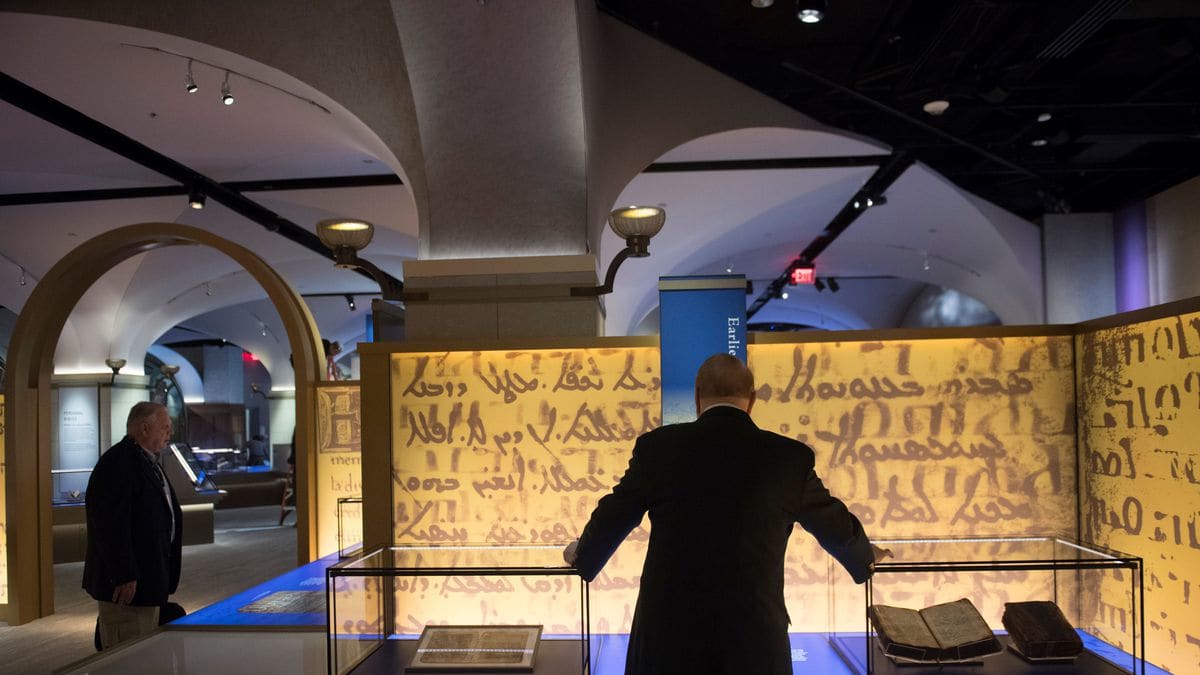https://www.thedailybeast.com/hobby-lobby-scandal-widens-as-museum-of-the-bible-admits-oxford-prof-sold-illicit-papyri-to-green-family
Hobby Lobby Scandal Widens as Museum of the Bible Admits Oxford Prof Sold Illicit Papyri to Green Family
The Museum of the Bible revealed today that at least 13 Biblical fragments in its collection were illicitly sold by a Oxford professor to Hobby Lobby's Green family.

Getty
In June The Daily Beast reported on the possibility that an illustrious award-winning professor at the University of Oxford had sold an ancient fragment of the Gospel of Mark that did not belong to him to crafting giant Hobby Lobby, Inc.
At the time of purchase the Green family, the owners of Hobby Lobby, planned to donate the fragments to Museum of the Bible, the charitable organization and DC-based museum they founded. Statements released today by Museum of the Bible and the Egypt Exploration Society reveal that the Mark fragment was just the beginning of the scandal. Investigations have revealed that (so far) 13 pieces in the Museum's collection are in fact the rightful property of the Oxford-based non-profit Egypt Exploration Society.
The artifacts in question are all Bible and Bible-related fragments; 12 were written on papyrus and one on parchment. In other words, just the kinds of things that fit the Green Family and Museum of the Bible's interests. They are part of the Oxyrhynchus Collection, a vast collection of fragments from ancient trash-piles in the city of Oxyrhynchus (modern Al-Bahnasa) in Egypt. The collection was excavated in the late 19th to early 20th centuries and most of it is now the property of the Egypt Exploration Society, which acts as curator of an Oxford-based collection.All of which raises the question: how did a U.S.-based company and, later, museum come to be in possession of these ancient Egyptian artifacts? According to the EES statement, they "were taken without authorization from the EES … Eleven of these pieces came into [Museum of the Bible's] care after being sold to Hobby Lobby Stores by Professor [Dirk] Obbink, most of them in two batches in 2010." The Museum of the Bible's statement more directly confirms that the antiquities were "sold illegally" by a "known expert." A spokesperson for Museum of the Bible further clarified to The Daily Beast, that of these 13 items, only four are the property of the museum, with the remainder belonging to Hobby Lobby as part of the Green Collection.Both the EES and the University of Oxford confirmed that Obbink is "under investigation … [for] the removal and alleged sale of EES texts." In the meantime, the University of Oxford confirmed that Obbink continues to be employed there. The university was unable to comment on whether or not Scotland Yard are involved.
Of the 13 illicit Oxyrhynchus items currently in Museum of the Bible's collection, two were sold by another buyer. In an online comment Mike Holmes, who heads up Museum of the Bible's Scholar's Initiative, stated that the second buyer was "Khader M. Baidun & Sons/Art-Levant Antiquities of Israel. The exact circumstances of how those two items moved from Oxford to Israel are unknown to" the Museum of the Bible. Both the Green family and Obbink had ties to the Baidun family. Obbink once jointly owned an antiquities company called "Castle Folio" with a man named Mahmoud Elder who, in turn, served as an officer for another company with Alan Baidun. Additionally, a member of the Baidun family was arrested in Israel in 2017 following investigations into a separate antiquities smuggling scandal involving Hobby Lobby. As revealed by The Daily Beast in 2015, Hobby Lobby was subject to a federal investigation for illegally importing illicit antiquities in 2011. The case was settled in 2017.
By cooperating with the EES and helping to facilitate the return of the stolen items there's no question that Museum of the Bible is doing the right thing here. But there are still questions about how something like this happened in the first place. The EES notes in their statement that in most cases, not only was the item itself taken, but the identifying card catalogue and photograph were also missing. It was only because the EES had back-up records that they were able to identify the missing unpublished texts. In response to the statements, noted New Testament scholar and papyrologist Brent Nongbri writes on his blog that "The sale of the manuscripts and the attempt to cover it up by removing records is almost unbelievable."
Then there's the question of the buyer, in this case Hobby Lobby. The invoice released by Museum of the Bible in June says nothing about the origins of the papyrus fragment other than just "Egypt." This is legally insufficient. There should be an export date, supporting documentation, and a history of ownership. An enquiry from The Daily Beast to Hobby Lobby, last June, asking for additional provenance details for the sale did not receive any response. The Museum of the Bible, for its part, is not entirely in the clear: any museum accepting donations or loans to its collection should ask for full documentation of the legal status of the item.
Obbink did not immediately respond to inquiries from The Daily Beast but 18 months ago, in a brief response to emails, he stated that any story that he tried to sell a fragment of the Gospel of Mark to the Green family "is not true."
If the allegations are true, they reveal a perfect storm of complicity between seller, buyer, and institution in which an unscrupulous academic was able to remove and sell valuable historical artifacts; a buyer was willing to look the other way on questions of provenance and legitimate ownership; and a museum failed to do due diligence when accepting donations.
Nongbri added that this may be a "cautionary tale" about academic superstars like Obbink. "There seems to have been very little oversight of Dirk Obbink by Oxford, the AHRC, the EES, or anyone else before this scandal broke… the EES has admitted that Dirk Obbink was keeping papyri in his personal office (allegedly the place where he was also peddling manuscripts). Even 'geniuses' need oversight."
As for Museum of the Bible, which is legally distinct from Hobby Lobby and was not involved in the purchase of these papyri, it's unclear what the fallout will be. Jill Hicks-Keeton, assistant professor of religious studies at Oklahoma University and co-editor of The Museum of the Bible: A Critical Introduction, told me "This is bad news [for Museum of the Bible] – worse for Obbink, whose scholarly credentials are often raised by MOTB advocates as evidence of the museum's legitimacy. The disgrace of Obbink should raise serious questions in all of our minds about the Museum of the Bible. Chief among mine is why its Director of the Scholars Initiative is releasing the evidence. If the Museum of the Bible will use this news to publicly distance itself from the scandal, we should be wary. Steve Green is still its board chair…Is the Museum really distancing itself from its past and charting a new course, or merely coming clean about some scandals to give the appearance of reform?"
For the field of papyrology this may be a moment of reckoning. One of their most distinguished luminaries—a MacArthur "genius grant" winner, no less—is alleged to have sold antiquities that he did not own. When I spoke to Nongbri in June he told me "If this isn't a one-off thing, and there are more records of sales, it becomes harder to believe that other scholars who work closely with Dirk Obbink didn't know this kind of thing was going on." The scale of the problem, as Nongbri notes, is still undetermined. If items were illicitly leaving the Oxyrhynchus collection and being funneled through Baidun it's possible that other items (and indeed dealers) are involved. Perhaps this is the tip of the iceberg. It's also possible that other Oxyrhynchus papyri were sold to different U.S. buyers. Regardless of the scale of the problem, the fact that items could leave the collection at all demonstrates that there is a need for greater transparency in the administration of shared intellectual and cultural heritage.
-- Sent from my Linux system.

No comments:
Post a Comment